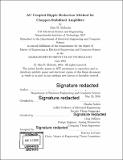AC coupled ripple reduction method for chopper-stabilized amplifiers
Author(s)
Sloboda, Alex R
DownloadFull printable version (7.354Mb)
Other Contributors
Massachusetts Institute of Technology. Department of Electrical Engineering and Computer Science.
Advisor
Charles Sodini and Greg DiSanto.
Terms of use
Metadata
Show full item recordAbstract
There exists a variety of applications where precision voltage amplifiers are required to faithfully sense and properly filter signals. While methods have been developed to create such precision amplifiers, these methods typically suffer from increased output noise. In the case of chopper amplifiers, this increased output noise comes in the form of narrow bandwidth, high frequency noise referred to as ripple noise. To reduce this ripple noise many topologies and techniques have been created and put into practice. However all of these topologies and techniques come at some cost in larger circuit area, higher power consumption, or increased noise. An AC coupled ripple reduction filter for chopper-stabilized precision amplifiers has been developed to reduce the cost of filtering out ripple noise. What follows is an explanation of ripple noise, an examination of existing ripple reduction methods, the presentation of the AC coupled ripple reduction filter, and simulated evidence of improved performance with this new method over existing methods in terms of smaller area, lower power consumption, and reduced noise.
Description
Thesis: M. Eng., Massachusetts Institute of Technology, Department of Electrical Engineering and Computer Science, 2018. Cataloged from PDF version of thesis. Includes bibliographical references (page 44).
Date issued
2018Department
Massachusetts Institute of Technology. Department of Electrical Engineering and Computer SciencePublisher
Massachusetts Institute of Technology
Keywords
Electrical Engineering and Computer Science.